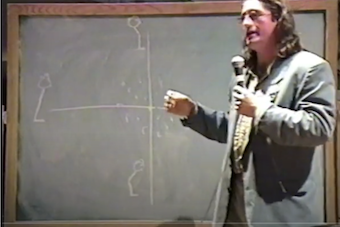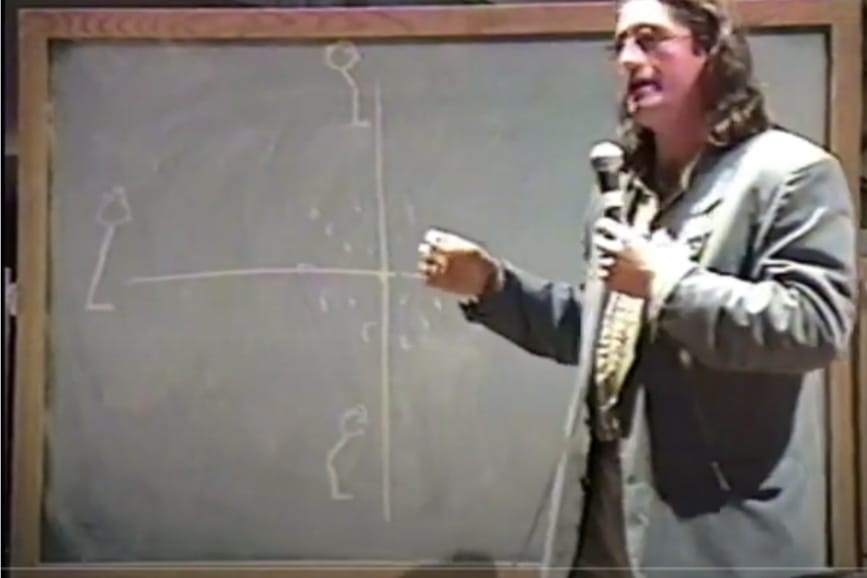
Why Robots Fall Down

Life is like riding a bicycle.
To keep your balance,
you must keep moving.
— Albert Einstein
In 1993, I delivered the keynote address at Cybernetics in the Art of Learning, the American Society for Cybernetics annual conference in Philadelphia. The talk, titled Why Robots Fall Down, explored the link between cybernetics and human movement coordination, which was initially highlighted in Norbert Wiener’s Cybernetics in 1948.
Wiener’s work discusses the role of kinesthetic perception in guiding movement, arguing that we cannot think about perceptions merely as inputs and movement as outputs. Instead, we must consider the nervous system as an integrated whole, where circular causality, in general, and feedback, in particular, govern sensory-motor correlation.
My presentation built on this legacy by incorporating the findings from recent research in kinesiology, neurophysiology, and physical medicine to propose an understanding of the role of feedback in movement. Building on the original insights of cybernetics and presenting research findings from three different areas of investigation — posture, balance, and disease — I offered a report from the field, expanding on cybernetic themes to provide insight into the complexity of human movement and the nature of learning.
After the talk, I led the group through a short Awareness Through Movement lesson. Heinz von Foerster and Humberto Maturana gave formal comments on the paper, followed by a discussion with the audience.
Jude Lombardi recently digitized the video she recorded during the talk and follow-on discussion, which she posted to YouTube. You can watch the video by clicking on this link.
Since the beginning of my presentation is missing from the recording, we have made the full text available on the Mind in Motion Online (MIMO) website. To access it, follow these steps:
- Log in to your MIMO account.
- Go to the “Library” section.
- Find the “Wrestling for Higher Consciousness” category.
- Look under “Documents” for the file.
If you don’t have a MIMO account, you can get one for free here. This account gives you access to this document and a collection of complimentary Awareness Through Movement lesson recordings. Feldenkrais teachers and trainees are eligible for a professional “Become a Better Teacher” account, which offers additional resources, including hundreds of ATM transcripts, at no cost.
This Sunday, 17 March 2024, I will present Embodied Feedback: Second-Order Cybernetics and Somatics at the monthly American Society for Cybernetics online meeting.
Classic cybernetics has long relied on the nervous system’s control of movement to illustrate how communication and self-regulation function. Second-order cybernetics evolved to explore the nature of observing systems and how we, as observers, influence and construct our perceptions. This shift in perspective parallels the development of somatics, which considers the body as experienced from within, from physical therapy and bodywork.
However, somatics has yet to appreciate the role of cybernetic circuitry fully and needs a systemic framework to understand mind-body connections, sensations, self-image, attitudes, and abilities. On the other hand, cybernetics can be too abstract and removed from subjective experience.
Therefore, my presentation aims to address the following questions:
- How can these approaches learn and benefit from each other?
- Can a second-order approach help us understand the surprising physical transformations somatics can bring about?
- Can body-based exploration ground conceptual understanding of our lived experiences?
If you are interested in attending the talk, please sign up here. There is no charge.
The program starts at 12:00 noon US Eastern time. (To find out when the event is happening where you are, please click here.)
The photo at the top of this post is a snapshot from the video of me giving the keynote address mentioned above
Your thoughts?
Please let us know your perspective! Add your comments, reactions, suggestions, ideas, etc., by first logging in to your Mind in Motion account and then clicking here.
Commenting is only available to the Mind in Motion Online community.
Join in by getting your free account, which gives you access to the e-book edition of Articulating Changes (Larry's now-classic Master's thesis), ATM® lessons, and more — all at no charge whatsoever.
To find out more and sign up, please click here.
Please share this blog post
 This work is licensed under a Creative Commons Attribution-ShareAlike 4.0 International License
This work is licensed under a Creative Commons Attribution-ShareAlike 4.0 International License
This blog may contain one or more affiliate links. When you click on a link and then make a purchase, Mind in Motion receives a payment. Please note that we only link to products we believe in and services that we support. You can learn more about how affiliate links work and why we use them here


Larry,
You said in the email the event starts at 9am Eastern, yet eventbrite puts at 12:00pm ?
Thanks for asking, Bob.
The event does start at noon Eastern time. (It’s 9 AM Pacific, which is when I have to be there. Sorry for the confusion.)